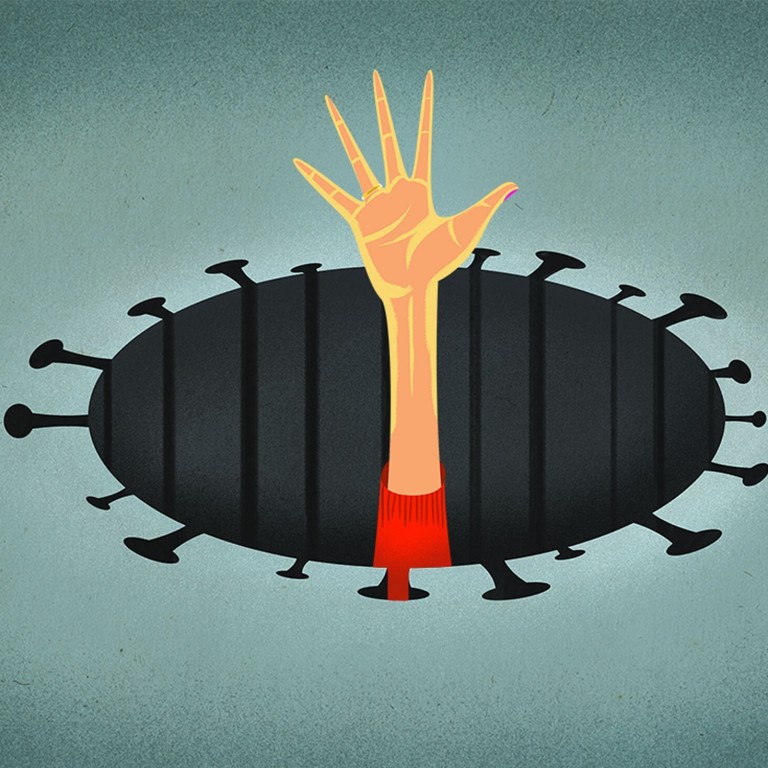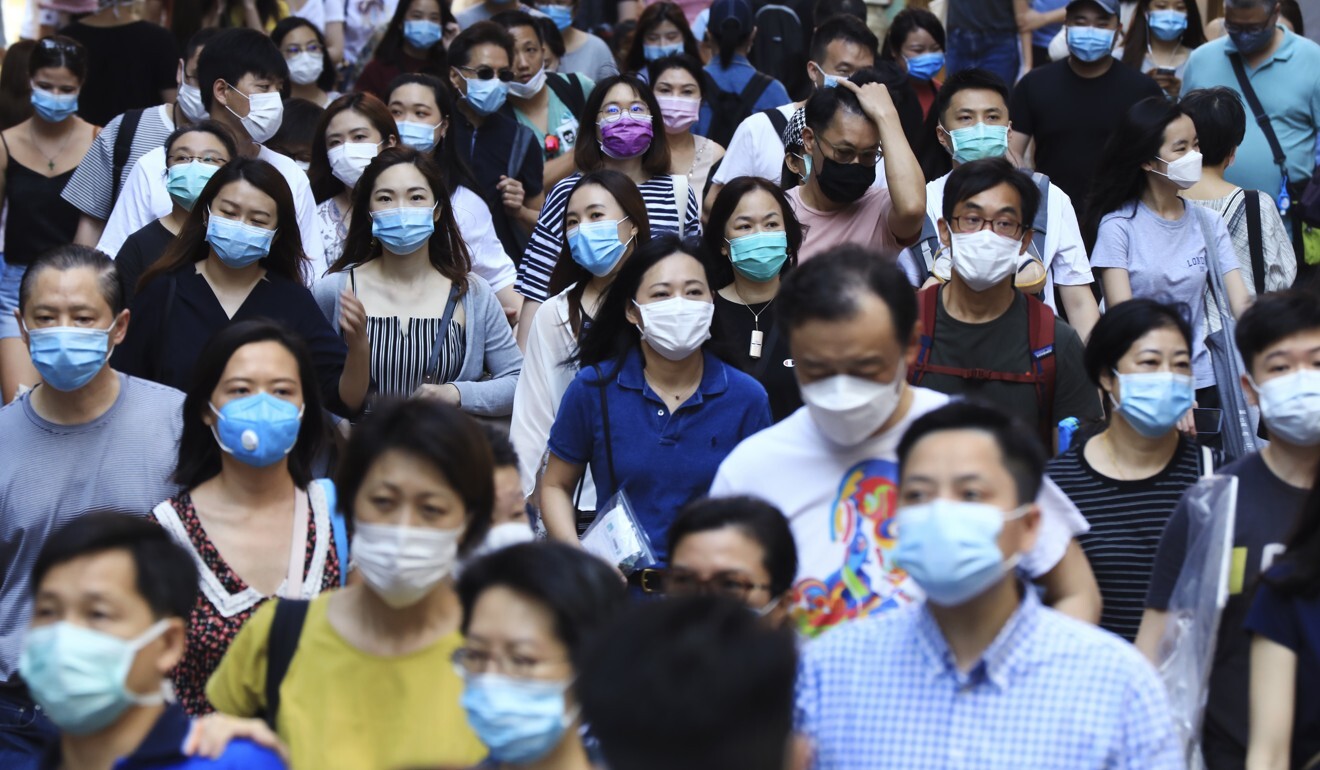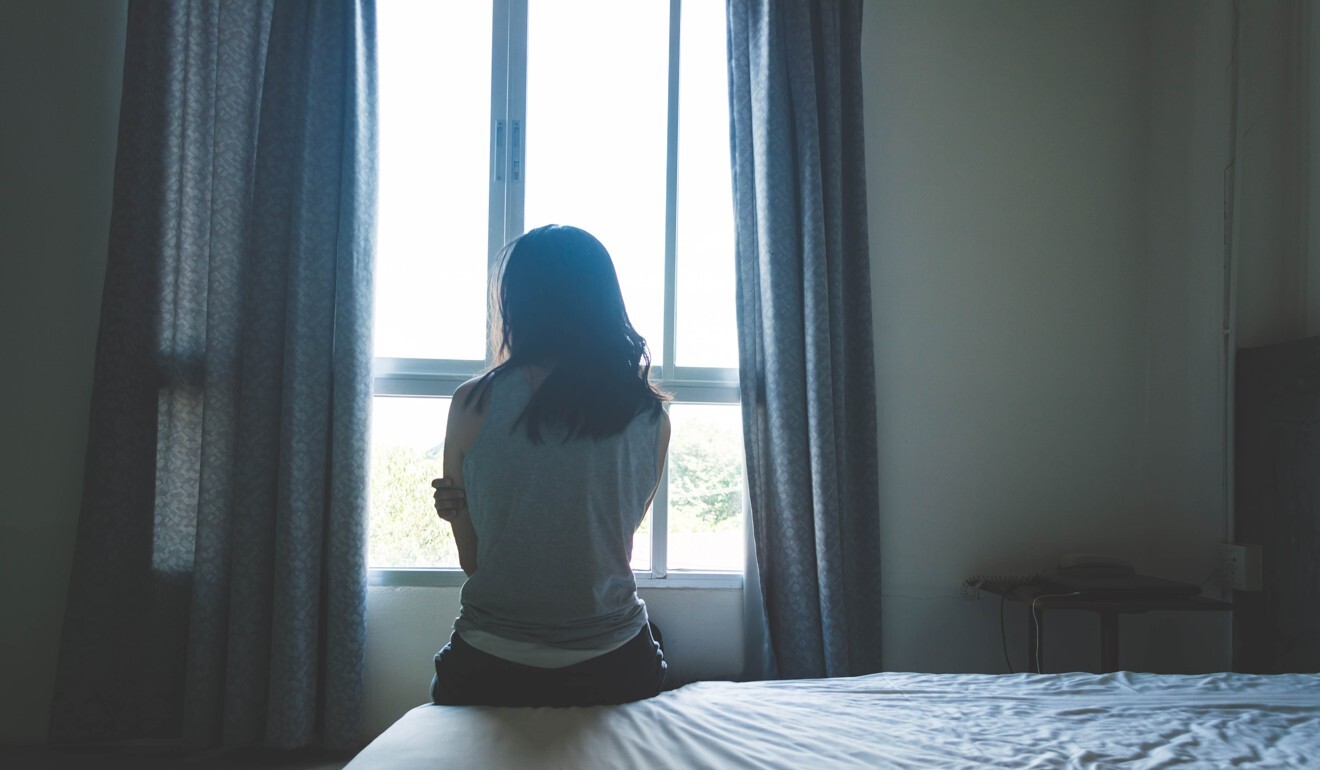
Isolated during Covid-19, Hong Kong’s victims of sexual violence relive their terror, seek emotional support
- Rape victim says staying home has triggered painful memories, setting back recovery
- Sex abuse centre RainLily received 200 hotline calls in March, up 30 per cent from previous months
Living by herself, she tries hard to keep busy, working on her projects, watching television, practising yoga and cooking. Anything to keep from remembering the darkest moments of her life.
She was raped eight years ago.
A third-year university student at the time, Teng was approached by a man around her age at a bar, and they chatted about university life.
She remembers being sober before she was served a drink he ordered for her. Then her consciousness faded, and the next thing she knew, she was pressed under him on a bed in his flat.
Teng did not tell police about it, as she did not want to go through the legal process and recount what had happened.
It is not a broken bone or a scratch or a cut in the flesh. It is something intangible. Sex affects our self-esteem and confidence, and the way we see ourselves
She also felt abandoned by those she told. Her parents were angry with her – their only child – and her father remained doubtful of her story. Her boyfriend broke up with her.
“I felt really lost. I was broken emotionally. I was angry with everything,” says Teng, who asked to be identified only by her surname. “That experience made me a different person.”
Being home alone during the pandemic has brought back painful memories for Teng and others like her. Stress, disrupted social networks and limited access to help services have made life tougher for survivors of sexual violence.

Counsellor Tiffany Ng Wing-lam, of RainLily, Hong Kong’s first sexual violence crisis centre, says: “As life slows down during the pandemic, the victims of sexual violence find themselves with more time to think about their traumatic experiences, and their mental state becomes more volatile. They need more emotional support than usual in crises like this.”
Victims find themselves dwelling on traumatic experiences inflicted by friends, colleagues, family members and strangers.
#MeToo movement unearths heartbreaking reality of sexual assault in Hong Kong
RainLily, which was formed in 2000 and provides counselling and crisis intervention to victims of sexual violence, received about 200 hotline calls in March, up 30 per cent from previous months.
Psychiatrist Dr Hui Lung-kit says although the pandemic itself may not directly trigger traumatic memories in victims of sexual violence, its impact on society, including lockdown and quarantine, can be overwhelming to them – especially if the incidents occurred in their homes or involved family members.
The coronavirus has killed more than 300,000 people and infected more than 4 million worldwide. Hong Kong has recorded more than 1,050 cases, four of whom have died.
The pandemic has also exacerbated the risk of sexual violence by intimate partners and family members, as victims have no escape at home.
In a joint statement on April 24, RainLily and two other help centres – the Harmony House and The Women’s Foundation (TWF) – reported more domestic and sexual violence cases in Hong Kong during the pandemic.
Fiona Nott, chief executive officer of TWF, a non-profit organisation, says quarantine and social-distancing rules have increased the risk of sexual violence at home. The violence is worsened further by stressors from infection fears and financial difficulties in households.
“Sexual violence is a pervasive problem in Hong Kong. The pandemic has exacerbated that,” she says.
Lawyer Gordon Oldham says he has received an increased number of inquiries from women as well as men about domestic violence, including sexual violence, during the pandemic.
Victims have sought legal advice on seeking a divorce, reporting to police, and obtaining a court order against abusers, he says.
Father admits sexually assaulting daughter for 12 years, starting when she was just 11 years old
“For those already in abusive relationships, the time spent together and the mental effects of the pandemic only exacerbate the situation,” he says.
Police statistics show 146 cases of indecent assault and rape were reported in the first three months of 2020, and 107 suspects were arrested.
According to the Social Welfare Department, based on data collected from police, social workers and medical professionals, 979 cases of sexual violence were reported in Hong Kong in 2019, slightly lower than 1,020 cases in 2018.
The 2019 total comprised 778 cases of indecent assault, or about 80 per cent of the cases, and 159 cases of rape, or about 16 per cent. Women accounted for about 98 per cent of victims.
A World Health Organisation (WHO) report last month called for awareness of rising violence against women during the pandemic.
“Violence against women tends to increase during every type of emergency, including epidemics,” it said.

According to the WHO, one in three women worldwide has experienced physical or sexual violence by an intimate partner, or sexual violence by any perpetrator in their lifetime.
But despite being more vulnerable in this time, victims have limited access to help because such services have been scaled back as part of measures to slow the spread of the virus.
RainLily’s Ng says the centre, which serves about 2,000 victims of sexual violence annually, has stayed open during the pandemic, though some victims postponed or cancelled their appointments for fear of infection. More have sought help over the phone.
Most clients receive help for about half a year, but some receive extended counselling over one or two years, or even longer.
Hong Kong dad jailed for 16 years for ‘despicable’ sexual abuse of his daughter over a decade
Most victims are hesitant to ask for help as they feel too ashamed, or the abuser is someone they know, or they fear retaliation.
According to TWF, one in seven women in Hong Kong has experienced sexual violence, but nine in 10 victims choose not to come forward.
Those who make a report must go through medical examinations, tell police and endure the court process, which can all prove daunting.

Ng says Hong Kong also has a culture of victim-blaming in sexual violence cases.
To mark sexual assault awareness month in April, TWF launched a month-long campaign named “MakePeopleCount” on April 28 to raise awareness of sexual violence in Hong Kong, and call for urgent changes to legislation, employment policies and the education curriculum.
Nott from TWF says the pandemic provides an opportunity for society to challenge the status quo of sexual violence.
Rape survivor Teng says for years she repressed all memories of the incident, although she had occasional flashbacks. She had mood swings, struggled with self-esteem, and became distrustful of others.
It was not until two years ago, when she ended a three-year relationship, that she realised she needed help. Seeing a doctor weekly and going through therapy for a year helped, and she also mended her relationship with her parents.
“It is not a broken bone or a scratch or a cut in the flesh. It is something intangible,” she says. “Sex affects our self-esteem and confidence, and the way we see ourselves.”
The pandemic set back her recovery, disrupting her work as events she was preparing to cover were cancelled.
With less to do and social-distancing rules in place, she has been spending more time at home alone, which makes her uncomfortable.
She is also afraid of asking for help from family and friends, after years of pretending to be strong, and feels she needs to go back to her doctor.
“Things have started turning rocky again. After all these years, I’m still trying to escape from that trauma,” she says.
Help us understand what you are interested in so that we can improve SCMP and provide a better experience for you. We would like to invite you to take this five-minute survey on how you engage with SCMP and the news.

